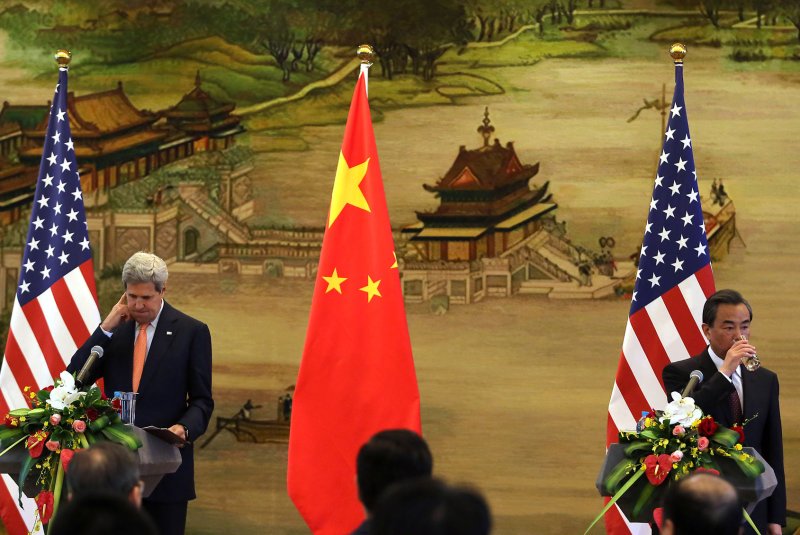U.S. Secretary of State John Kerry holds a joint press conference with Chinese Foreign Minister Wang Yi at the Ministry of Foreign Affairs in Beijing in May. Wang filed a complaint with Kerry after U.S. Defense Secretary sailed on a U.S. warship in the South China Sea. File Photo by Stephen Shaver/UPI |
License Photo
BEIJING, Nov. 6 (UPI) -- China's foreign minister filed a "serious protest" with U.S. Secretary of State John Kerry, a day after U.S. Defense Secretary Ashton Carter sailed on the USS Theodore Roosevelt in the South China Sea.
Beijing's Foreign Ministry said Friday that Wang Yi had made references to the maritime dispute during a phone conversation with Kerry. Wang said President Xi Jinping had achieved a series of important joint agreements with the United States during his September state visit.
"The process we have in place does not want to receive unnecessary interference," Wang had told Kerry, according to the ministry. Beijing, however, did not mention how Kerry reacted to Wang's comments.
While sailing on the aircraft carrier on Thursday, Carter had said the United States wants open dialogue with China, but that Beijing needs to make room for a balance of power in the South China Sea.
"The American approach to the security structure for Asia is an inclusive one, we're not trying to make divisions," Carter told The Wall Street Journal. "We want China to be part of the security system of Asia and not to stand apart from it."
China's growing naval presence in one of the world's busiest shipping routes has been provoking responses from irate neighbors and from the United States, after Beijing refused to stop land reclamation activities in the disputed Spratly Islands.
The United States' increasing role in a dispute where Washington is not a claimant has escalated since a defense ministerial meeting of the member countries of the Association of Southeast Asian Nations, or ASEAN, ended in a dispute with no final statement issued.
"Great powers' actions can only be restrained by the balancing efforts of other great powers," said Zhang Baohui, a political analyst at Lingnan University in Hong Kong, adding that ASEAN influence on events that affect them are now a "fantasy."
The United States does not recognize Chinese sovereignty over its claimed areas in the South China Sea, and on Oct. 27 a U.S. warship sailed within a 12-mile radius of Subi Reef, which China has staked as its own territory.















